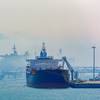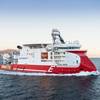Tropical Storm Bill punched the Texas coast with heavy rains and strong winds on Tuesday, the National Weather Service said, just three weeks after floods killed about 30 people in the state.
The second named tropical storm of the 2015 Atlantic hurricane season made landfall near Matagorda, a sportfishing town near the South Texas Nuclear Generating Station in Bay City, a coastal nuclear power plant.
Spokesman Buddy Eller said the plant had prepared for the storm and operations were normal with full staffing.
Companies said output from oil platforms in the Gulf of Mexico, which pumps about a fifth of all domestic crude, was unaffected.
But BP Plc shut its Mad Dog and Atlantis fields early on Tuesday after a pipeline outage that was expected to be fixed soon, a source said. It was unclear if the storm caused the outage.
Vessel traffic was halted in the Houston Ship Channel, the biggest U.S. petrochemical port, and ports in Galveston and Texas City, officials said.
Forecasters cautioned that tornadoes were possible across much of Texas. Flash flood watches were issued for six states. The watch area included Houston and central Texas, where floods over Memorial Day weekend last month swept over thousands of vehicles and damaged homes.
The storm was projected to churn through central Texas toward Austin and Dallas, though tropical storm-force winds near 60 miles per hour (96 km) extended 150 miles (241 km) from the center.
Heavy rain had already drenched parts of Texas over the weekend, pushing high rivers closer to overflowing their banks. The National Hurricane Center said the storm was expected to weaken into a tropical depression overnight, but it could bring up to 8 inches (20 cm) of rain to eastern Texas and Oklahoma and up to 4 inches (10 cm) to Arkansas and southern Missouri.
Around Houston, the fourth-largest U.S. city, school districts suspended summer classes, and 209 flights were cancelled at the two airports serving the city, according ot tracking service FlightAware.com.
Voluntary evacuations were called for some low-lying areas south of Houston.
Flooding could snarl work in Texas oilfields, but producers including EOG Resources and ConocoPhillips said operations were normal.
More than 45 percent of U.S. refining capacity and half of natural gas processing capacity sits along the U.S. Gulf Coast.
Onshore, LyondellBasell deployed sandbags at its refining and chemical facilities. Refiner Phillips 66 said operations had no weather impacts.
(By Kristen Hays; Additional reporting by Erwin Seba, Anna Driver and Kristen Hays; Writing by Terry Wade; Editing by Larry King and Tom Brown)











